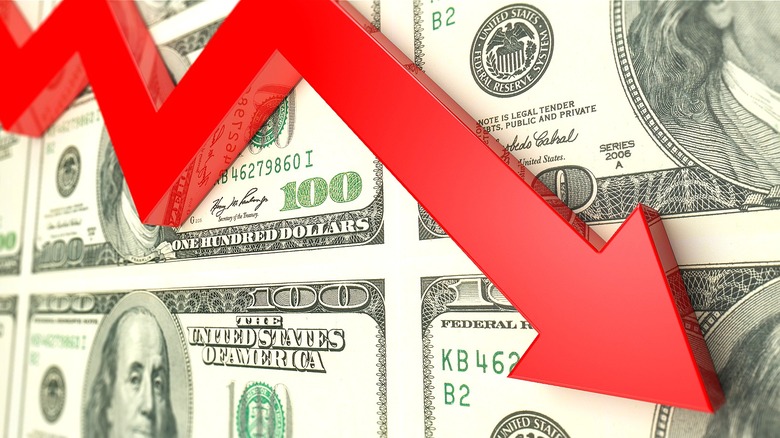These Are America's Top Wealth Killers
Increasing wealth isn't only something Americans across the country routinely think about, but it's a task that is actually attainable. While many wealthy people start with a major head start, a number of quality financial habits the world's wealthiest people maintain help keep them on track. Features like strong budgeting principles and the maintenance of a solid emergency fund make all the difference for those looking to build lasting wealth for themselves and their families. Unfortunately, there are plenty of ways to eviscerate wealth, too.
Apart from chronic misuse of credit cards and other lending products, there are actually quite a few easy ways to find yourself spiraling in a negative financial direction. These "wealth killers" often act silently — sometimes completely in the background. In addition to the monetary decisions that lock consumers into stagnation in the middle class, a lack of knowledge surrounding inflation or the best way to shop for lifestyle necessities can also erode household wealth tremendously. Bill Gates once mused on the difference between being born poor and dying poor, noting the journey in between is full of choices you can make to improve your financial circumstances. Avoid these wealth killers to make the most of each one of these opportunities.
1. Failing to account for inflation
Inflation is one of the most important financial realities Americans must account for. In simplest terms, inflation is the continuous increase in price that virtually every good and service experiences over the long term. During times of economic stress, inflation may rise in prominence and be given plenty of airtime on news channels. But inflation remains at play even during periods of growth and economic prosperity. On average, prices rise about 2% to 3% every year, meaning a dollar today experiences the buying power of about 98 cents after a year of sitting idly.
For this reason, any type of money management solution that sees large sums of cash just sitting in your checking account or any other type of vessel that doesn't fight against the tide of inflation is one that's worth your time. Inflation is particularly dangerous to those in worse financial circumstances. The ability to buy in bulk, for instance, is something often reserved for those who feel comfortable in spending more money today to save a greater overall volume down the road.
Similarly, saving for the future without also taking inflation into consideration will place you in a position of financial weakness when it comes time to make a later purchase. Always look for a high- interest savings account or any other investment opportunity that stands to grow your money by at least the same margin as inflation shrinks it in order to defend against this vicious wealth killer.
2. Mismanaging your retirement assets
In addition to the passive forces of modern finance that can deplete wealth, people who mismanage their long-term savings tools play an active role in deflating future wealth. Retirement savings should be a priority for all Americans, regardless of what stage in life they currently occupy. Young and old alike must plan to support themselves in their retirement and contribute funds to pension plans and/or retirement investment accounts accordingly. Tax-advantaged investment vessels like a Roth IRA can produce tremendous growth, especially if they're utilized early on in a saver's life.
Generally speaking, a moderately aggressive investment strategy will see your retirement savings double roughly every seven years. Failing to start saving up for retirement early on in your career can easily see the sacrifice of one or more doubling periods between the time you start to save and when you ultimately begin to draw down on these funds. At the end of your saving journey, a doubling of your money could mean the difference between an anemic retirement portfolio and one that turns you into a multimillionaire and eliminates almost any level of financial struggle as you enjoy your golden years. In another sense, this difference also changes the calculation of what you'll ultimately leave behind to your loved ones, influencing their wealth as well.
3. Maintaining a static budget
Budgeting is a core value in smart money management. Everyone should build a budget that makes sense for their income and expenses. Operating without a budget is like driving to a novel destination without first checking where it lies on the map and hoping for the best. But building a budget isn't a singular task that demands one afternoon of thought and an eternity of utilization.
Things change for people on a regular basis, with promotions potentially increasing salaries and unforeseen setbacks sometimes slashing them. You are also likely to run into life-changing situations that demand budgetary reevaluation. You might decide to move, changing the cost of your mortgage, or your landlord might suddenly increase your rent. Families may welcome new children into the home or perhaps even begin contributing to an elderly parent's expenses and care needs.
All of these things dramatically shift the way your money must be leveraged on a daily, practical basis. Operating a static budget is therefore nearly just as much a wealth killer as is traversing the financial landscape of the modern world without one. It's a good idea to review your budget every once in a while, perhaps even on a monthly basis if you're particularly worried about any shifting financial factors. And of course, if something big changes in your life one of the first things you should do is evaluate how it affects your monthly budget.
4. Forgoing the use of an emergency fund
An emergency fund is a truly essential budgetary feature. It sits prominently in Dave Ramsey's baby steps, and it's a core component of nearly every other financial adviser's and pundit's advice. It can be easy to overlook the value of an emergency fund if you've never created one for yourself before. Yet, this stopgap financial solution is a critical tool that helps preserve wealth. Those who aren't building wealth over the long term likely are the same people who haven't taken the time to set aside money for an emergency fund.
The service this money performs can mean the difference between weathering a sudden, temporary financial storm or relying on a lending product that'll throw you deeper into debt. Emergency funds should aim to cover between three and six months of regular expenses, whatever that means for your own budget. However, an intermediate goal acts as a stepping stone toward this fully formed safety net. Dave Ramsey suggests focusing on setting aside $1,000 to begin your journey toward financial independence; indeed, this can act as a valuable first step. Failing to utilize an emergency fund will leave you vulnerable to the whims of high-interest rates that decimate long-term wealth.
5. Buying a brand new car
Perhaps the most underrated and yet intensely draining wealth killer lies in the marketplace of cars. Vehicles parked outside the home have become an essential resource for millions when commuting to work, performing routine tasks, and participating in everyday hobbies and activities. However, many consumers have fallen into the trap of thinking about this transportation asset as a status symbol and therefore something that should be upgraded as frequently and luxuriously as possible.
Humphrey Yang, a former financial adviser with Merrill Lynch who now provides financial advice on YouTube and TikTok, goes as far as to call it the No. 1 wealth killer — and it's a silent one at that, often flying under the radar. In reality, your car can/will continue to perform its primary function for years — decades even, perhaps. There's no reason to replace your car when it's performing its duties without issue beyond simple vanity. It's for this reason that buying a new car is potentially the most immense wealth killer in the financial world.
This isn't to say consumers should never buy a new car. There are lots of reasons why making this choice might be beneficial beyond a simple visual, stylistic update. If you've recently had another child, for instance, a larger car might facilitate the rigors of your lifestyle much more competently. When shopping around for a new car, however, it's important to keep the payment obligation of any selection you might make in perspective. Also, you should always take time to think about whether you actually need to make this financial commitment; chances are the answer is no or at least "not yet."





